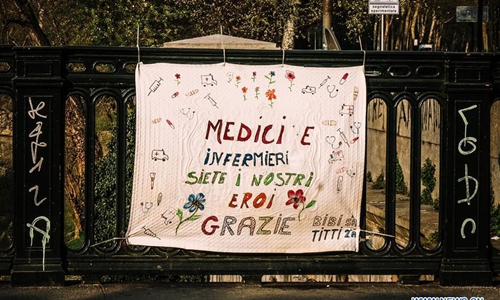HOME >> CHINA
Europe’s COVID-19 turning point no sooner than late April: analysts
By Zhang Han Source:Global Times Published: 2020/4/6 23:18:40

A piece of cloth with words "Doctors and nurses, you are our heroes" is seen on a fence in Turin, Italy, on April 4, 2020. lives. Photo: Xinhua
Italy reported 525 deaths from COVID-19 on Sunday, marking a lowest record in past weeks, as the European country's lockdown measures adopted in early March appeared to have lowered infections, while experts said with global efforts, the disease may subside at the end of April.
Based on the Chinese experience, the effects of a strict lockdown would show two weeks later, but the measures in Italy only flattened the curve so far without generating a clear inflection point, which means their lockdown did not cut community and family transmissions at the very beginning, analysts said.
As Italy gradually upgrades measures and more countries impose lockdowns and social distancing, China's top respiratory expert Zhong Nanshan said the global pandemic would subside in late April if countries carry out strict quarantine rules.
Italy reported 4,316 new cases Sunday, lower than the peak time daily increases of above 6,000. The number of deaths and patients in intensive care also dropped. But the country's Civil Protection agency chief Angelo Borrelli warned, "This good news shouldn't make us lower our guard."
The high mortality rate in Italy in the early stage was a result of overly strained medical resources and a lack of understanding of the new virus. The situation has been eased with Chinese aid and expert teams who shared rescue and treatment experience with Italian medical professionals, said Yang Zhanqiu, a virologist from Wuhan University.
Emanuele Caroppo, a doctor in Rome, predicted the turning point would come in four to five weeks. Chinese expert teams have eased the lack of medical supplies, but more importantly, they brought the plasma of recovered patients, introduced traditional Chinese medicine and shared their medical guidelines, Caroppo told the Global Times.
There is also good news for other European countries as France and Spain's new coronavirus deaths also dropped and Germany reported fewer daily new infections for the fourth consecutive day on Sunday.
These European countries are seeing a flattening curve, but a sharp drop like that in China may not occur as their social distancing rules are not as strict and community transmissions have not been completely cut off, Yang said.
Zhong believes if countries take strong control and prevention measures, Europe and the world could see the COVID-19 pandemic waning in late April.
Zhong warned that city lockdowns do not mean people can party or hold gatherings within the city as the key is "social distancing."
A Chinese living in Milan, Lu Ruiying, reduced her grocery trips to every two weeks from once a week. Lu told the Global Times that the lockdown was loose at first but gradually tightened, and she saw fewer people outside in the past weeks.
Chinese experts earlier advised Italy to quarantine mild patients to prevent them from spreading the coronavirus to their family. "If such transmissions are not eliminated, no matter how flat the curve is, there will always be new infections," Yang noted.
Global medical experts agree that social distancing is the only way to curb the spread of the novel coronavirus. Following Italy, Spain and France have adopted some form of lockdown to reduce infections from overloading their healthcare systems.
Posted in: SOCIETY